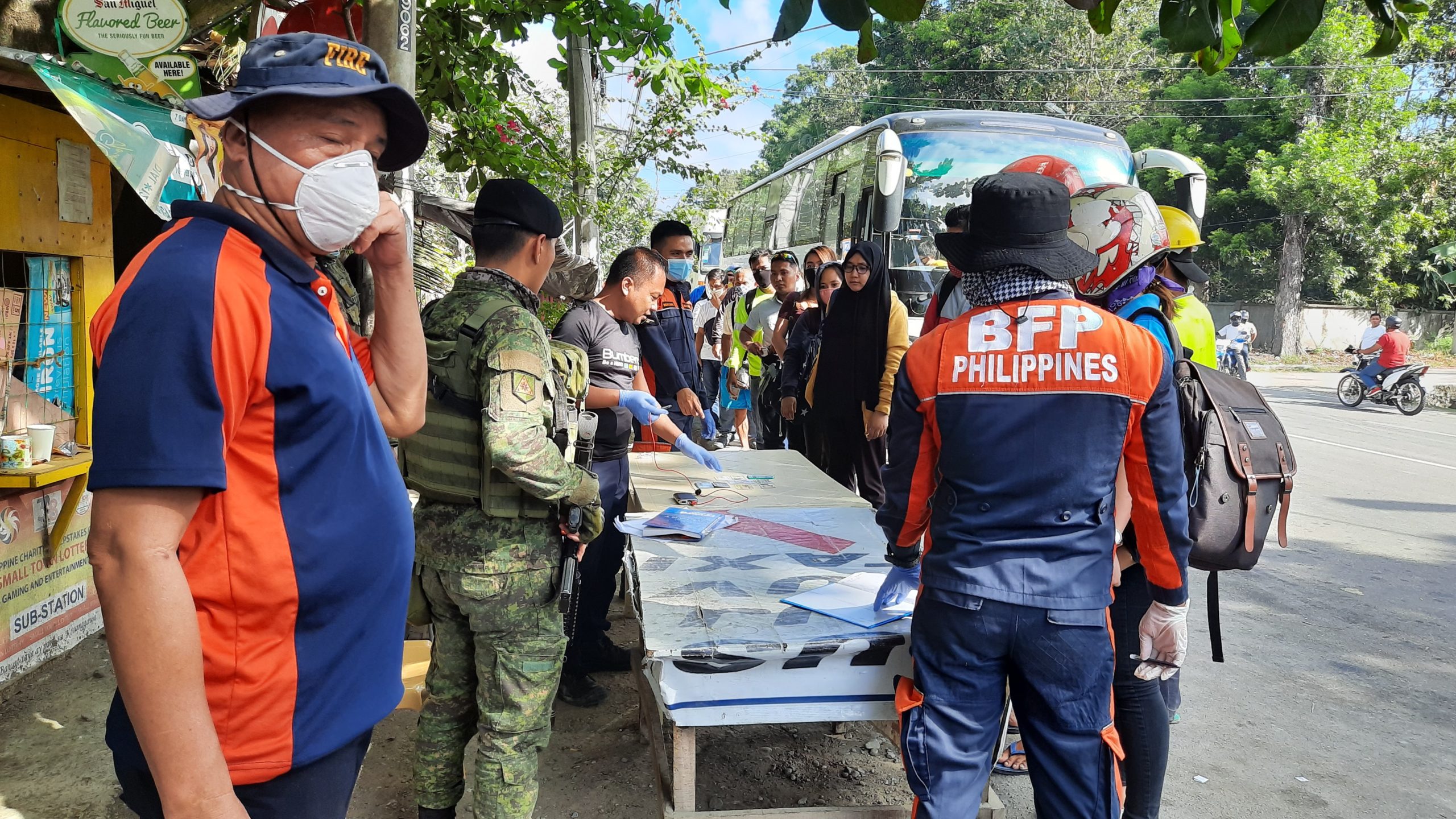
COMMUNITY QUARANTINE Firefighters, some of them wearing face masks, man a checkpoint along the national highway in Barangay Dalipuga, Iligan City, to regulate the movement of people while the city is under a community quarantine. —RICHEL UMEL
DAVAO CITY—Their high-powered firearms now proving useless against a microscopic threat, troops belonging to the antiterror squad here patrolled San Pedro Street, wearing black cloth masks that doctors don’t recommend.
A soldier told the Inquirer that the cloth mask was not really endorsed by his superiors but he merely bought it from street vendors as the threat of an unseen virus gripped residents.
Since pharmacies have long run out of surgical masks, people make do with the cloth masks made by local shops and were being sold briskly by the few vendors remaining in the streets.
“Cloth masks are not recommended under any circumstance,” said Dr. Kathryn Roa, an infectious disease specialist, as she told people what they should do to protect themselves against the virus.
“Just because they’re running out of face masks, they’re making face masks out of linen, that’s so sad,” she remarked.
Soap, water
As streets started to get deserted, the few who venture out wear cloth masks, thinking this would protect them from the virus. Even a security guard and a fruit vendor, who could not get a cloth mask, make do with a towel wrapped around their mouths and noses.
Roa said that even wearing surgical (not cloth) masks would work only when combined with frequent hand-washing and good hand hygiene.
“Face masks alone would not protect you,” she said. “Our best friend is soap and water. Alcohol is only the next best thing.”
But for those who would insist on wearing masks, and by this, she was referring to surgical masks, she said they should make sure their hands were clean before wearing them.
“Wash your hands thoroughly with soap and water, before putting on the mask,” Roa said. “As soon as you put it on, the outside part is already considered contaminated, do not touch it. To remove the mask, never touch the front part. Instead, use the loops and wash your hands afterward.”
She said she often saw the mask being worn covering the nose and mouth at the start of the day, go below the nose at noontime and farther down below the chin in the afternoon.
‘Wear with commitment’
“If you wear a mask, wear it with commitment,” she said.
Roa earlier raised the alarm over the shortage of personnel protective equipment (PPE), which included masks, for health care workers who would be at the forefront in the fight against the COVID-19 pandemic.
She said the front-liners needed all the protection they could get to be able to take care of their patients.
Healthy people wouldn’t need surgical and even N95 masks because they would only contribute to the shortage and put the lives of health care workers at risk, she said.
“Just think, if health professionals get sick, who will take care of the patients?” Roa asked.
She earlier reacted to the “no-mask, no entry” policies imposed by schools and public officials in the early part of the crisis which, she said, would only contribute to the shortage of PPEs for health care workers and would not protect both the public and the healthy people wearing them.
Stay home
Medical practitioners said healthy people should instead reserve those masks for the sick.
“In Japan, they call it a sick mask because you only wear it when you are sick,” said Roa. “But now, we are telling you, if you are sick, stay at home, don’t go out, you don’t need to wear a mask.”
Dr. Jean Lindo, an anesthesiologist, said in a separate interview she was even surprised to see a taxi driver wearing a mask at the height of the COVID-19 scare. “I asked him, ‘Why are you wearing a mask, are you sick?’ But he said, ‘No, this was only required by the company.’”
To illustrate this point, Lindo said three healthy people, each wearing a mask, could still get easily infected once a sick person who is not wearing a mask suddenly sneezes, spreading infectious droplets around.
“The droplets will be on everyone’s hair, clothes, mobile phones and even masks,” she said. “So, it’s best for a healthy person to give the mask to the sick person to wear because wearing it would be useless.”
“This is not the time to be thinking of yourself alone,” Roa said. “To combat the virus, we have to take care of each other.” INQ